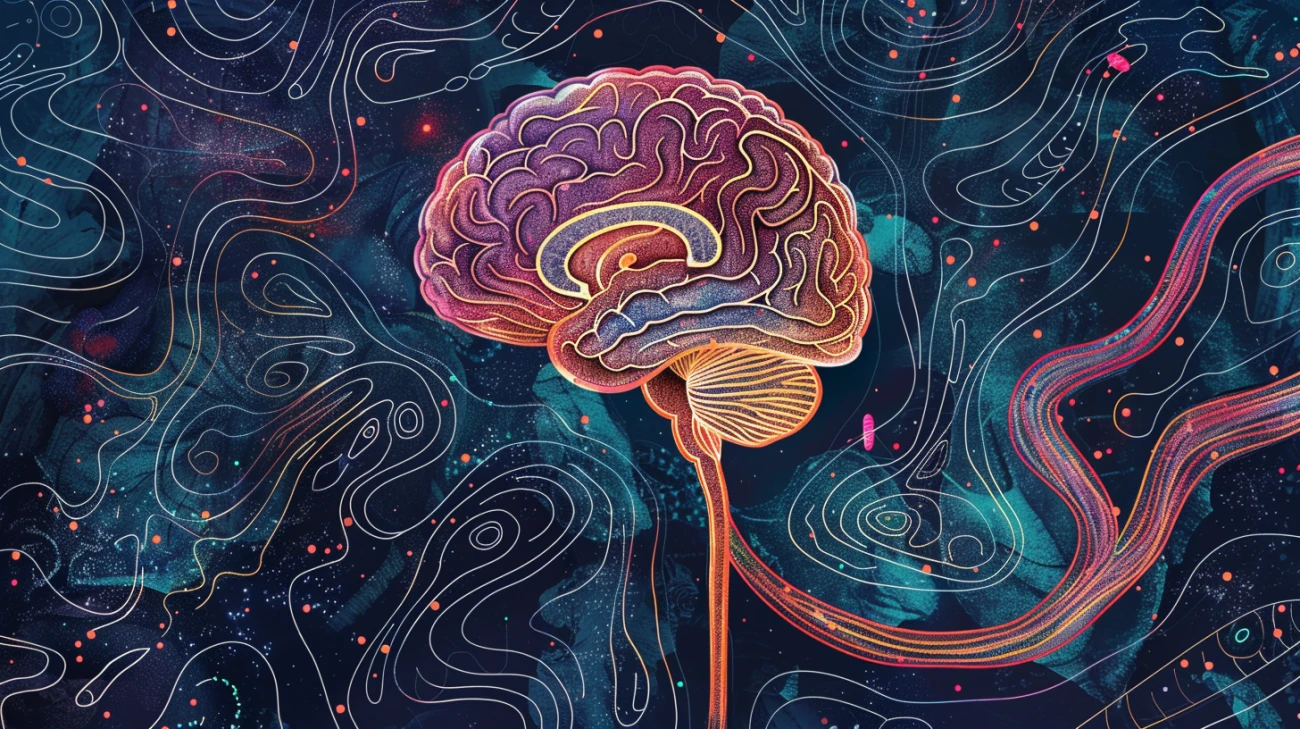Jelita a depresja: Nieoczekiwane powiązania
Czy zastanawiałeś się kiedyś, jak ważne dla naszego zdrowia psychicznego są nasze jelita? Najnowsze badania naukowe rzucają nowe światło na ten nieoczekiwany związek, łącząc problemy w obrębie układu pokarmowego z zaburzeniami nastroju, takimi jak depresja. W artykule "Zdrowie jelit a depresja: Badania nad nieoczekiwanymi związkami" zagłębimy się w fascynujący temat interakcji między mikrobiomem jelitowym a naszym mózgiem, odkrywając, w jaki sposób równowaga w naszych jelitach może wpływać na nasze samopoczucie i ogólne funkcjonowanie. Kluczowe wnioski:- Nieprawidłowa flora bakteryjna w jelitach może przyczyniać się do rozwoju zaburzeń nastroju, takich jak depresja.
- Dieta bogata w składniki odżywcze i probiotyki może mieć pozytywny wpływ na zdrowie psychiczne.
- Stres i zaburzenia osi mózg-jelita mogą prowadzić do stanów zapalnych w organizmie, co może być powiązane z depresją.
- Terapia jelitowa, w tym suplementacja prebiotyków i probiotyków, może stanowić obiecującą metodę leczenia depresji.
- Dalsze badania nad związkiem między zdrowiem jelit a zdrowiem psychicznym mogą przynieść przełomowe odkrycia w dziedzinie psychiatrii i medycyny.
How the Brain-Gut Axis Functions
The connection between our digestive system and our mental health is truly remarkable. At the heart of this relationship lies the brain-gut axis, a complex network of communication between the gastrointestinal tract and the central nervous system. This bidirectional pathway allows our gut to send signals to the brain and vice versa, influencing our mood, cognition, and overall well-being.
The gut is home to a diverse community of microorganisms, collectively known as the gut microbiome. These tiny inhabitants play a crucial role in maintaining a healthy depresja a jelita balance, as they produce various neurotransmitters and metabolites that can directly impact brain function. When this delicate ecosystem is disrupted, it can lead to an imbalance that may contribute to the development of mental health disorders, such as depression.
One of the key mechanisms by which the gut microbiome influences the brain is through the production of short-chain fatty acids. These molecules can cross the blood-brain barrier and modulate neuroinflammation, neurotransmitter synthesis, and even gene expression in the brain. By understanding these intricate connections, we can begin to unravel the complex relationships between depresja a jelita.
Furthermore, the gut-brain axis is also influenced by the body's stress response. Chronic stress can disrupt the integrity of the gut lining, leading to increased intestinal permeability and the release of inflammatory signals that can reach the brain. This cycle of stress and inflammation can ultimately contribute to the onset and progression of depression.
Nutritional Deficiencies and Depression: The Role of the Gut Microbiome
The food we consume plays a critical role in maintaining the health and diversity of our gut microbiome, which in turn can have a significant impact on our mental well-being. Certain nutrients, such as omega-3 fatty acids, vitamins, and minerals, are essential for the proper functioning of the depresja a jelita axis.
When we experience nutritional deficiencies, it can lead to an imbalance in the gut microbiome, resulting in the overgrowth of harmful bacteria and the depletion of beneficial ones. This disruption can trigger inflammation, oxidative stress, and impaired neurotransmitter production, all of which are associated with the development of depression.
Interestingly, studies have shown that individuals with depression often exhibit lower levels of certain nutrients, including vitamin D, folate, and zinc. Ensuring a balanced and nutrient-rich diet, or supplementing with targeted probiotics, can help restore the gut microbiome and potentially alleviate depressive symptoms.
By understanding the complex interplay between nutrition, the gut microbiome, and mental health, we can explore new avenues for the prevention and treatment of depression, focusing on the importance of depresja a jelita.
Stress and the Gut: Mechanisms Leading to Mood Disorders

The relationship between stress and the gut is a crucial factor in understanding the connection between depresja a jelita. Chronic stress can have a profound impact on the delicate balance of our gut microbiome, leading to a cascade of physiological changes that can ultimately contribute to the development of mood disorders.
When we experience prolonged stress, our body's stress response system, the hypothalamic-pituitary-adrenal (HPA) axis, is activated. This activation can increase the production of stress hormones, such as cortisol, which can disrupt the integrity of the gut lining and lead to increased intestinal permeability, a condition known as "leaky gut".A leaky gut allows the passage of undigested food particles, bacteria, and toxins into the bloodstream, triggering an inflammatory response throughout the body. This systemic inflammation can reach the brain, contributing to the development of depression and other mental health issues.
Additionally, stress can alter the composition of the gut microbiome, leading to an imbalance between beneficial and harmful bacteria. This disruption can have far-reaching consequences, affecting the production of neurotransmitters, such as serotonin, which play a crucial role in regulating mood and cognitive function.
Diet and Mental Health: How Food Impacts Our Well-Being
The food we consume has a profound impact on our overall health, and this extends to our mental well-being as well. The connection between depresja a jelita is a testament to the importance of a balanced and nutrient-rich diet in supporting our psychological and emotional state.
Certain dietary patterns, such as the Mediterranean diet, which is rich in fruits, vegetables, whole grains, and healthy fats, have been associated with a lower risk of depression. Conversely, diets high in processed foods, sugar, and unhealthy fats can contribute to inflammation and gut dysbiosis, potentially exacerbating depressive symptoms.
- Consuming a diverse range of plant-based foods can help nourish the gut microbiome and provide essential nutrients for brain function.
- Incorporating probiotic-rich foods, such as fermented vegetables, yogurt, and kefir, can help restore the balance of the gut microbiome and support mental health.
By understanding the profound influence that our diet has on the depresja a jelita axis, we can make more informed choices to support our overall well-being and potentially alleviate the symptoms of depression.
Gut-Directed Therapy for Depression: A Modern Therapeutic Approach
As our understanding of the connection between depresja a jelita deepens, new and innovative therapeutic approaches are emerging that target the gut as a means of addressing mental health concerns. This modern approach, known as gut-directed therapy, offers promising alternatives to traditional treatments for depression.
One of the key interventions in gut-directed therapy is the use of probiotics, which are live microorganisms that can help restore the balance of the gut microbiome. Studies have shown that probiotic supplementation can have a positive impact on mood and cognitive function, potentially reducing depressive symptoms.
Additionally, the use of prebiotics, which are non-digestible fibers that serve as food for the beneficial bacteria in the gut, can also be a valuable tool in gut-directed therapy. By nourishing the gut microbiome, prebiotics can indirectly support mental health and well-being.
Beyond supplementation, dietary modifications and lifestyle changes that support gut health, such as reducing stress, getting enough sleep, and engaging in regular physical activity, can also be integrated into a comprehensive gut-directed approach to treating depression.
The Future of Gut-Depression Research: Promising Directions
As our understanding of the complex relationship between depresja a jelita continues to evolve, the future of research in this field holds great promise. Scientists and healthcare professionals are exploring new avenues to uncover the intricate mechanisms underlying this connection and develop more effective interventions for mental health disorders.
One area of particular interest is the role of the gut-brain axis in the development of personalized medicine. By analyzing an individual's gut microbiome and identifying specific imbalances or deficiencies, healthcare providers may be able to tailor treatment plans that target the root causes of depression and other mental health conditions.
- Advancements in technology, such as improved gut microbiome analysis and real-time monitoring, will continue to enhance our ability to understand the complex dynamics of the depresja a jelita axis.
- Collaborative research efforts between disciplines, including gastroenterology, psychiatry, and nutrition, will likely lead to groundbreaking discoveries that expand our knowledge and improve treatment options for individuals struggling with depression.
As we delve deeper into the fascinating realm of the depresja a jelita connection, the future holds great promise for a more holistic and personalized approach to mental health care, revolutionizing the way we understand and address the complex interplay between our gut and our mind.
Podsumowanie
Okazuje się, że pomiędzy naszymi jelitami a nastrojem istnieją ścisłe zależności. Badania pokazują, że depresja a jelita są ze sobą ściśle powiązane - nieprawidłowa flora bakteryjna jelitowa może przyczyniać się do rozwoju zaburzeń depresyjnych. Dlatego tak ważne jest zadbanie o zdrowie naszego układu pokarmowego, by wspierać również nasze zdrowie psychiczne.
Ważne są nie tylko składniki odżywcze, ale również probiotyki i prebiotyki, które mogą pozytywnie wpływać na równowagę w jelitach i polepszać samopoczucie. Ponadto warto zadbać o regulację stresu, który może prowadzić do zaburzeń w osi mózg-jelita. Podejście holistyczne, łączące terapię jelitową i leczenie depresji, wydaje się być obiecującą drogą do poprawy zdrowia psychicznego.

